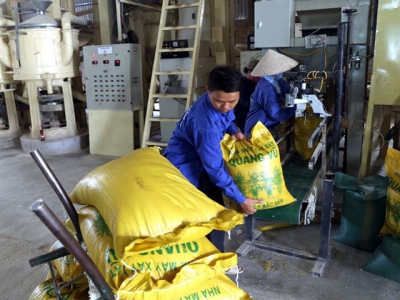VN sees rice export growth by year-end

A worker moves rice bags at a private agricultural processing company in Phước Lộc Commune, Tuy Phước District, Bình Định Province. — VNA/VNS Photo Vũ Sinh
HÀ NỘI — Việt Nam expects rice exports to regain strength by the end of the year after a brief lull, said Trần Văn Công, deputy director of the Agro Processing and Market Development Authority under the Ministry of Agriculture and Rural Development.
Over the first nine months of this year, Việt Nam shipped 4.9 million tonnes of rice abroad, earning US$2.5 billion, up 22 per cent from the same period last year.
Công said that this is an impressive result, attributing the achievement to the effective rice sector restructuring programme which focuses on developing high-quality and fragrant rice to bolster exports to choosy markets.
Up to 80 per cent of exports now are classified as high-quality rice and sold at more than $500 per tonne, he said, adding that market diversification has been a catalyst for Vietnamese rice shipments
China’s sudden imposition of a 50 per cent tariff on rice imports from July affected rice consumption in this market, especially sticky rice. At some points, Chinese traders paid only $380 per tonne for sticky rice, compared to the $530-540 per tonne at the beginning of the year. However, Vietnamese firms have worked to enhance rice exports to Iraq, the Philippines, Malaysia, the Ivory Coast and the United Arab Emirates (UAE).
The price of sticky rice has also increased from just below $400 per tonne in July and August, to $440 per tonne now. Furthermore, as local firms reduce export costs, Vietnamese rice will gain a competitive edge over that grown in India and Thailand, Công noted.
In the coming time, purchase demand will is forecast to pick up in some countries, such as the Philippines, which will be needing to import an additional 500,000-800,000 tonnes of rice by the end of this year to refill exhausted reserves and stabilise the domestic rice price. Meanwhile, Indonesia and several African countries also hold great demand for rice imports in response to output decline due to floods and storms.
Besides, the Government’s new Decree 107/2018/NĐ-CP replacing Decree 109/2010/NĐ-CP, which takes effect from October 1, will remove difficulties and legal barriers for rice exporters to expand their foreign markets.
According to the decree, rice exporters will no longer be required to own rice storage, paddy milling and grinding facilities with processing capacities of 5,000 tonnes of rice. In addition, customs procedures will be simplified, creating favourable conditions for enterprises to export more to large consuming markets like China, Europe, Africa, Iraq, Cuba and the UAE.
Phạm Minh Thiện, general director of Cỏ May Co Ltd, said many provisions on rice export have been modified to suit the development of enterprises. It has created more favourable conditions for businesses to enter the market and to reduce costs significantly.
The amendments to the Decree 109 which was issued eight years ago will promote businesses and farmers to put more investment in the production and trading of high-quality rice. Farmers are encouraged to supply high-value rice for rice exporters.
Related news
 Local firms and farmers must meet tracebility requirements in foreign markets
Local firms and farmers must meet tracebility requirements in foreign markets Local enterprises and farmers needed more information about the origin of export products because importers and retailers overseas had higher demands
 Central Highlands provinces urged to expand avocado farming
Central Highlands provinces urged to expand avocado farming Avocado can only grow in certain areas with suitable soil conditions such as Mexico, Indonesia, Central America, and the Central Highlands of Việt Nam.
 Vietnam’s premium beans exported abroad, while local coffee quality remains poor
Vietnam’s premium beans exported abroad, while local coffee quality remains poor Vietnam exports nearly 2 million tons of high-quality coffee beans each year and imports 60,000 tons of processed coffee from Brazil, the US and China.